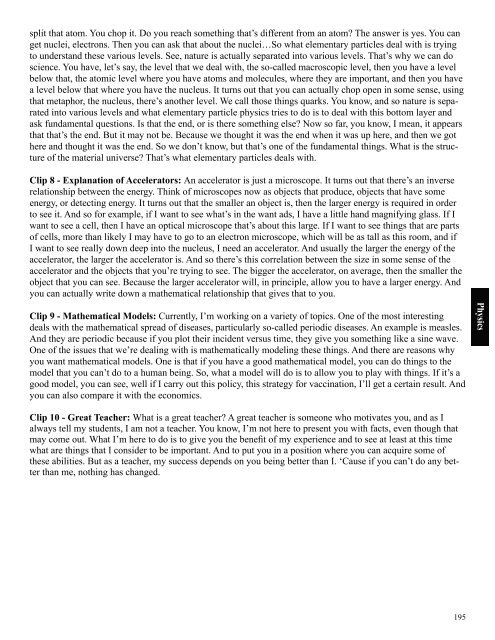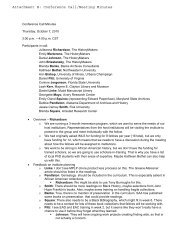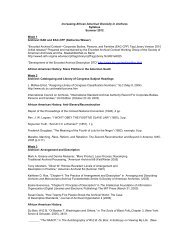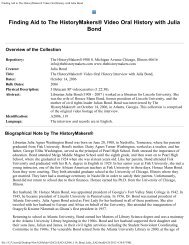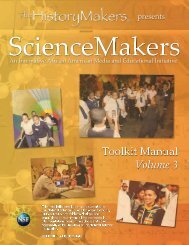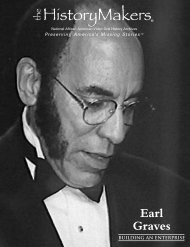ScienceMakers Toolkit Manual - The History Makers
ScienceMakers Toolkit Manual - The History Makers
ScienceMakers Toolkit Manual - The History Makers
You also want an ePaper? Increase the reach of your titles
YUMPU automatically turns print PDFs into web optimized ePapers that Google loves.
split that atom. You chop it. Do you reach something that’s different from an atom? <strong>The</strong> answer is yes. You can<br />
get nuclei, electrons. <strong>The</strong>n you can ask that about the nuclei…So what elementary particles deal with is trying<br />
to understand these various levels. See, nature is actually separated into various levels. That’s why we can do<br />
science. You have, let’s say, the level that we deal with, the so-called macroscopic level, then you have a level<br />
below that, the atomic level where you have atoms and molecules, where they are important, and then you have<br />
a level below that where you have the nucleus. It turns out that you can actually chop open in some sense, using<br />
that metaphor, the nucleus, there’s another level. We call those things quarks. You know, and so nature is separated<br />
into various levels and what elementary particle physics tries to do is to deal with this bottom layer and<br />
ask fundamental questions. Is that the end, or is there something else? Now so far, you know, I mean, it appears<br />
that that’s the end. But it may not be. Because we thought it was the end when it was up here, and then we got<br />
here and thought it was the end. So we don’t know, but that’s one of the fundamental things. What is the structure<br />
of the material universe? That’s what elementary particles deals with.<br />
Clip 8 - Explanation of Accelerators: An accelerator is just a microscope. It turns out that there’s an inverse<br />
relationship between the energy. Think of microscopes now as objects that produce, objects that have some<br />
energy, or detecting energy. It turns out that the smaller an object is, then the larger energy is required in order<br />
to see it. And so for example, if I want to see what’s in the want ads, I have a little hand magnifying glass. If I<br />
want to see a cell, then I have an optical microscope that’s about this large. If I want to see things that are parts<br />
of cells, more than likely I may have to go to an electron microscope, which will be as tall as this room, and if<br />
I want to see really down deep into the nucleus, I need an accelerator. And usually the larger the energy of the<br />
accelerator, the larger the accelerator is. And so there’s this correlation between the size in some sense of the<br />
accelerator and the objects that you’re trying to see. <strong>The</strong> bigger the accelerator, on average, then the smaller the<br />
object that you can see. Because the larger accelerator will, in principle, allow you to have a larger energy. And<br />
you can actually write down a mathematical relationship that gives that to you.<br />
Clip 9 - Mathematical Models: Currently, I’m working on a variety of topics. One of the most interesting<br />
deals with the mathematical spread of diseases, particularly so-called periodic diseases. An example is measles.<br />
And they are periodic because if you plot their incident versus time, they give you something like a sine wave.<br />
One of the issues that we’re dealing with is mathematically modeling these things. And there are reasons why<br />
you want mathematical models. One is that if you have a good mathematical model, you can do things to the<br />
model that you can’t do to a human being. So, what a model will do is to allow you to play with things. If it’s a<br />
good model, you can see, well if I carry out this policy, this strategy for vaccination, I’ll get a certain result. And<br />
you can also compare it with the economics.<br />
Clip 10 - Great Teacher: What is a great teacher? A great teacher is someone who motivates you, and as I<br />
always tell my students, I am not a teacher. You know, I’m not here to present you with facts, even though that<br />
may come out. What I’m here to do is to give you the benefi t of my experience and to see at least at this time<br />
what are things that I consider to be important. And to put you in a position where you can acquire some of<br />
these abilities. But as a teacher, my success depends on you being better than I. ‘Cause if you can’t do any better<br />
than me, nothing has changed.<br />
195<br />
Physics


